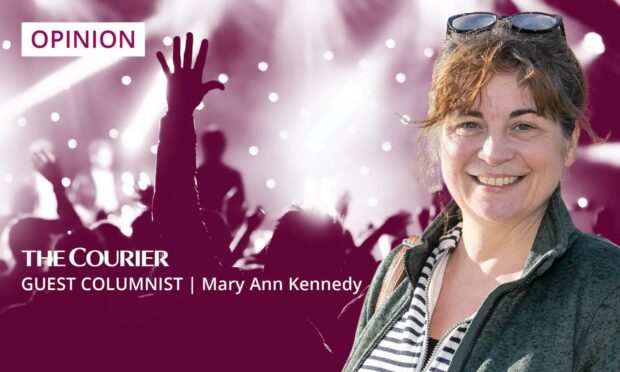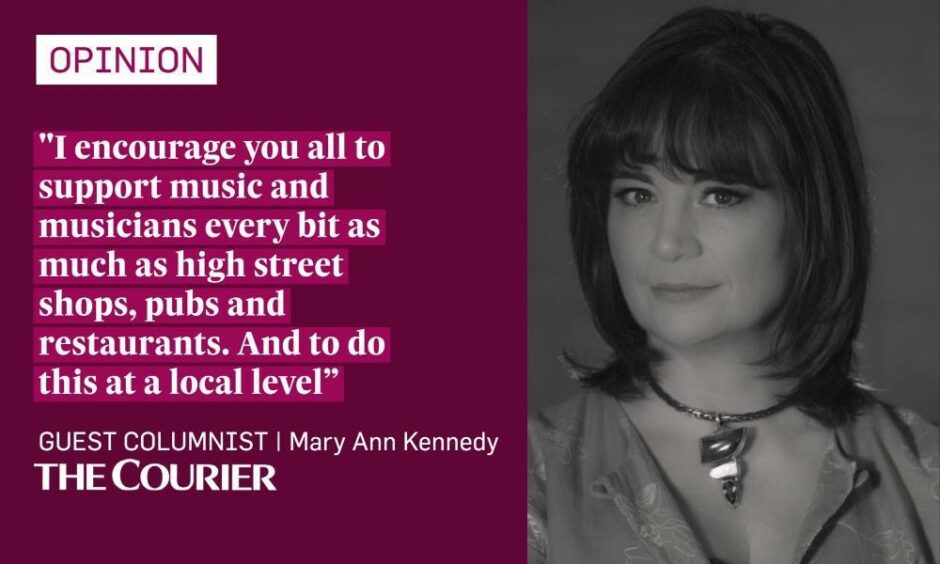This Saturday, I will be at the St Andrews Voices festival performing live with other musicians before an audience for only the second time since March 2021.
I will be joining old friends from Ireland and the Isle of Man in the Aon Teanga (One Tongue) collective, and meeting new musical friends in one of St Andrews University’s choirs.
And we will be playing for an audience that we can see, hear and interact with IRL – ‘In Real Life’ – at long last.
That dialogue that exists between musicians and listeners has been at a remove for us for so many months.
We can’t wait. We really can’t.
But behind the images of thousands gathering at the ‘big’ festivals and the myriad social media celebration posts from friends and others who are desperate to reclaim their touring and gigging life, behind the ‘gameface’ that so many of us wear, there’s a complicated backstage.
In the run-up to this concert, I have spent time over the past three months travelling by ‘boots, boats and bikes’ from coast to Scottish coast, from the sacred island of Iona to my festival destination of St Andrews.
And I’ve spent time along the way with singers, musicians, teachers, collectors and organisers, talking to them about their experiences in lockdown and the process of making our way back out beyond the weird times.
Mixed feelings on a changed landscape
It’s been inspiring, illuminating and humbling to listen to their stories.
To share tunes and songs with them in a process of reconnection.
And it’s been revealing.
The second leg of @NicUalraig's musical pilgrimage gets underway this week as she travels to Perth. 👣
First stop… Bridge of Orchy! Here she is on the slopes of Ben Dorain singing the opening to Duncan Bàn MacIntyre’s epic praise song for the mountain.🏔️ #SAVTriall pic.twitter.com/DsKwMGSoKp
— St Andrews Voices (@StAndrewsVoices) September 7, 2021
Some musicians are just not ready to return to the stage or simply to a place where there are many people from different airts and pairts gathered in one place in close proximity.
Others have changed their outlook on how they make and share their music.
Some have turned their back on their profession completely. Perhaps for financial reasons or from having lost heart in their vocation.
And many are suffering from severe stress, anxiety and depression as the overload of others’ expectations and demands of returning to working norms which do not chime with a still-restricted world take their toll.
Musicians industry is vital to the economy
We are one of Scotland’s most successful industries.
According to the Scottish Government, the Creative Industries contribute £4.6 billion to the Scottish economy each year.
Independent research reveals that nearly two thirds of Scots believe the arts and culture are an important part of their lives. A massive 84% believe it is right to fund the arts.
🙌🏻 The full version of this has some lovely thoughts on the nature of Scotland as a creative country, and is well worth a watch!https://t.co/tD1y1KcudO https://t.co/GVZKTNA9wU
— Creative Scotland (@CreativeScots) September 8, 2021
We are supported as many other areas of our country’s economy are supported.
And we are are tax-paying, contributing, active members of our communities, without whom people and places would be much diminished.
We train for years – whether in the formal world of the conservatoire or in the equally demanding rehearsal room world of rock and pop bands – to be able to do what we do to our utmost.
We are expected to be accountants, managers, promoters, team leaders, publicists, logistics directors, diplomats, administrators and international negotiators.
See, we reskilled a long time ago. (The UK government’s CyberFirst campaign just doesn’t know it yet.)
Fatima did not design nor make her costume, nor the set, she did not hang the lights or rehearse the orchestra, she doesn’t tear the tickets, she doesn’t buy the props, write the music, or publicise the show. What should those people do? They all need Fatima to keep dancing. pic.twitter.com/BWgvv91fGd
— Adrian Schiller (@Grumbletwat) October 12, 2020
We teach the next generation to make and appreciate music. To immerse themselves in a world that is proven to have a positive impact on mental wellbeing.
All the while acquiring transferable skills including numeracy, critical thinking and collaboration and cooperation.
That’s a pretty good deal.
Joy of returning is tinged with concerns
We are so happy to be back on stage doing what we love and sharing it with live audiences.
Being in St Andrews this weekend is a privilege and a joy, and I know how fortunate I am to be doing what I love for a living.
But we do this now in a world where our industry, like so many others, is in a fragile state.
In a world where music is such an easily accessible commodity online, free to listener and unremunerated to creator, I encourage you all to support music and musicians every bit as much as high street shops, pubs and restaurants.
And to do this at a local level.
The big festivals and top-level gigs only exist with the infrastructure that allows emerging and eclectic talent to develop.
That same infrastructure allows small and medium-scale gigs, local venues and ventures to thrive.
And it encourages a rich cultural ecology, nurturing the rich and complicated social and demographic world that music embraces.
So if you can, if you feel safe and ready, put the phone away and set the laptop to hibernate.
Go to a gig, buy an album, wear the T-shirt.
Let the music inspire you, but remember that you inspire us musicians likewise to carry on.
And for that we thank you.
Mary Ann Kennedy performs ‘Triall’ (The Journey) with Aon Teanga at the St Andrews Voices Festival on Saturday October 16 at the Laidlaw Music Centre, University of St Andrews. www.standrewsvoices.com
Follow Mary Ann’s musical pilgrimage from coast to coast online at www.youtube.com/watercolourfilms and on social media #SAVTriall

